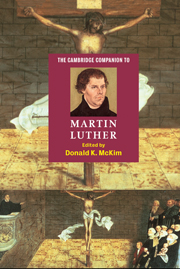Book contents
- Frontmatter
- Part I Luther’s life and context
- Part II Luther’s work
- 3 Luther’s writings
- 4 Luther as Bible translator
- 5 Luther as an interpreter of Holy Scripture
- 6 Luther’s theology
- 7 Luther’s moral theology
- 8 Luther as preacher of the Word of God
- 9 Luther’s spiritual journey
- 10 Luther’s struggle with social-ethical issues
- 11 Luther’s political encounters
- 12 Luther’s polemical controversies
- Part III After Luther
- Part IV Luther today
- Select bibliography
- Index
8 - Luther as preacher of the Word of God
from Part II - Luther’s work
Published online by Cambridge University Press: 28 May 2006
- Frontmatter
- Part I Luther’s life and context
- Part II Luther’s work
- 3 Luther’s writings
- 4 Luther as Bible translator
- 5 Luther as an interpreter of Holy Scripture
- 6 Luther’s theology
- 7 Luther’s moral theology
- 8 Luther as preacher of the Word of God
- 9 Luther’s spiritual journey
- 10 Luther’s struggle with social-ethical issues
- 11 Luther’s political encounters
- 12 Luther’s polemical controversies
- Part III After Luther
- Part IV Luther today
- Select bibliography
- Index
Summary
Martin Luther is famous as reformer, theologian, professor, translator, prodigious author, and polemicist. He is well known as hymn-writer, musician, friend of students, mentor of pastors, and pastor to countless clergy and laity. Yet he saw himself first of all as a preacher even though his only income came from his professorship at the University of Wittenberg.
No matter what else he was involved in, Luther preached, usually in Wittenberg's Stadtkirche. Unless he was away from home, he was in the pulpit at least as often as the congregation's pastor. Wherever he traveled, the local clergy insisted that Doktor Martin deliver the sermon.
Luther’s preaching ministry was remarkable, his productivity prodigious – almost miraculous. In the midst of lecturing, protesting against churchly abuses, translating, writing scores of theological treatises, adjusting to marriage and children, carrying on a voluminous correspondence, and attending almost endless meetings and conferences, in 1528 he preached nearly two hundred times in spite of severe headaches and dizzy spells. On forty days that year he preached twice; most years he preached over a hundred times. Among the slower years were 1522 with only forty-six sermons, and 1540 with forty-three. Of the approximately 4,000 sermons he preached in his lifetime, about 2,300 have been preserved in some form.
- Type
- Chapter
- Information
- The Cambridge Companion to Martin Luther , pp. 136 - 148Publisher: Cambridge University PressPrint publication year: 2003

